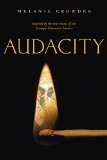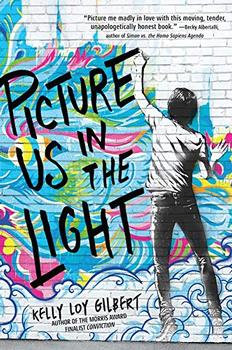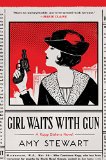Summary | Excerpt | Reviews | Beyond the book | Read-Alikes | Genres & Themes | Author Bio

Audacity, a historical young adult novel told in verse, is the story of real-life teen Clara Lemlich who immigrated with her Jewish family from Russia to New York City at the turn of the twentieth century and became a leading figure in the fight for factory workers' rights.
From the beginning, it's clear that Clara has a strong will and a mind of her own. She is determined to get an education at a time and in a culture where a girl educating herself was an act of disobedience. In an early chapter Clara says:
How can I tell Mama
who
toils
sunup
to
sundown
to
be a good mother
a
good wife
that
this life
(her
life)
is
not enough for me,
that
I dream instead
of
words
ideas
a
life that stretches far beyond
the
bounds of this shtetl?
The very short verse chapters have the sense of a journal, almost as if they are whisperings of the protagonist's very private thoughts and longings where she confesses and confides in the reader.
The story accurately paints a striking picture of the immigrant experience, and is an emotional map of oppression of the Jews, of women, and of the poor. The novel also brings New York City tenement and factory life at the turn of the twentieth century vividly into focus (see 'Beyond the Book'). The author captures the dreariness, drudgery and cruelty of working in a sweatshop while engaging the reader in a lyrical history lesson. Although the book starts out at a somewhat slow pace, it picks up speed about a third of the way in. At that point the tension continues to build so that near the end I found myself reading faster and faster — faster than I wanted, because I wanted to continue to linger with the language — but I was on the edge of my seat needing to find out what happened.
The novel is broken into five sections, each presenting a distinct chronological step along Clara's journey to becoming an activist. The poetic/verse form lightens the weight of the topics addressed, helping to keep the material from becoming too heavy-handed. I have to admit that in the beginning, as much as I enjoyed the poetic sensibility, I also found the form a bit distracting and even distancing as the writer in me kept wondering why the author chose to break a line or lay out a sentence the way she did. The form itself became a kind of puzzle I wanted to solve. But as I became invested in Clara and her struggles, my hyper-awareness of the verse form moved to the background.
Clara's character has a slow, gradual arc — it's not very big but is important and essential. She is at constant odds with her family and with the social injustices in her world. She is torn between dedicating herself to the fight for workers' rights and the desire to follow her more personal dreams—this struggle is where Clara finds most of her growth. It is Clara's love of language and of poetry that connects the verse form to her character. If you are a lover of words and of reading like Clara, you can't help but empathize with her.
The novel explores the challenge of sacrificing what you want for what you believe is right and just. There are also strong coming-of-age themes — growing into oneself, separate and different from one's family, and learning to have the courage to stand up and fight, struggles that teens will empathize with.
Audacity is an unforgettable and inspiring story that I would recommend to both teens and adults who like literary historical fiction with a strong female protagonist and to educators who will find this serious, spare novel a great choice for workers' and women's rights history lessons. Because of the short chapters and large percentage of white space on the page, this is also an excellent pick for reluctant readers.
![]() This review was originally published in The BookBrowse Review in January 2015, and has been updated for the
January 2016 edition.
Click here to go to this issue.
This review was originally published in The BookBrowse Review in January 2015, and has been updated for the
January 2016 edition.
Click here to go to this issue.

If you liked Audacity, try these:

by Kelly Loy Gilbert
Published 2019
Danny Cheng has always known his parents have secrets. But when he discovers a taped-up box in his father's closet filled with old letters and a file on a powerful Silicon Valley family, he realizes there's much more to his family's past than he ever imagined.

by Amy Stewart
Published 2016
An enthralling novel based on the forgotten true adventures of one of the nation's first female deputy sheriffs.
Harvard is the storehouse of knowledge because the freshmen bring so much in and the graduates take so little out.
Click Here to find out who said this, as well as discovering other famous literary quotes!
Your guide toexceptional books
BookBrowse seeks out and recommends the best in contemporary fiction and nonfiction—books that not only engage and entertain but also deepen our understanding of ourselves and the world around us.